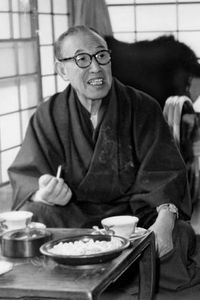Uchida's illustrious career began in the early 1920s at Taikatsu studio, but it was his association with Nikkatsu that brought him to the forefront of Japanese cinema. Alongside screenwriter Yasutarō Yagi, Uchida adapted literary works in a realist style, producing films that would later be recognized for their groundbreaking storytelling and cinematic techniques.
One of his most notable works from this period is the 1929 film A Living Puppet (Ikeru ningyo),which was selected as the fourth best film of the year by Kinema Junpo, a prestigious film journal. This film, along with many others from the 1930s, featured the talented actor Isamu Kosugi and showcased Uchida's ability to craft compelling narratives that explored complex social issues.
Policeman (Keisatsukan),a 1930s film that has been described as a "tremendously stylish gangster movie," is Uchida's only surviving complete silent film. This cinematic masterpiece borrows from Hollywood gangster films and expressionist techniques to tell the story of a young policeman's quest to track down an old friend who has turned to a life of crime. The film's exploration of the complex relationship between a cop and a criminal, once childhood friends, adds depth and nuance to the narrative.
Uchida's work during the 1920s and 1930s is characterized by its leftist social commentary and its ability to tackle complex social issues. Many of his films from this period were critically acclaimed and received recognition from Kinema Junpo, with Jinsei Gekijo being selected as the number two film of 1936, Karininaki Zenshin as the best film of 1937, and Tsuchi as the best film of 1939. Unfortunately, few of Uchida's prewar works have survived in their entirety.
In 1941, Uchida left Nikkatsu and attempted to start his own production company, but ultimately failed. He then joined the Manchukuo Film Association in 1943, although he never completed a film during his time there. Uchida's career was interrupted in 1945 when he was taken prisoner and held in Manchuria until 1954, when he returned to Japan.
Upon his return, Uchida joined the Toei studio and began directing films that showcased his versatility and ability to adapt to different genres. His post-war movies reveal a strong genre stylist with no immediately discernible themes, much like many golden-age Hollywood directors. Uchida effortlessly directed chamber dramas, comedies, and samurai epics, often in color, and with a forward-looking dose of irony.



















